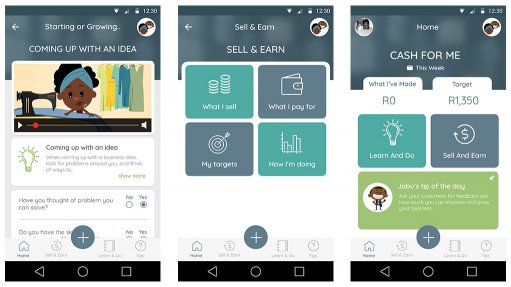
To assist South African microentrepreneurs in tracking growth in their business, as well as provide basic business concept training and essential business tools, small business incubator and investor Awethu has developed a virtual incubator (VI) app.
The mobile app is currently available on Android devices, is free to download from Google’s PlayStore and is data-lite.
Awethu business development manager Georgie Howden tells Engineering News Online that the app seeks to address the issue of youth unemployment in South Africa, with the country having one the highest rates of youth unemployment in the world.
The VI app boasts a number of features, including a bookkeeping tool and peer-to-peer incubation pods, which reward app users for business growth, app participation and business formalisation.
Pods give users the opportunity to network with other entrepreneurs, to jointly problem solve and to mentor each other.
Incentives are also built into all aspects of the app, assisting users in growing their own businesses. These incentives are in the form of in-app badges and funding and one-on-one mentorship for star performers.
Howden notes that entrepreneurs, who want to start a business, grow a business, make more money, and improve their lives but lack the entrepreneurship training, support, funding and access to markets to be able to do so, will benefit most from the app.
She adds that the app may result in a multiplier effect, with the microenterprises employing more than five employees, and earning more than R200 000 in yearly turnover.
Howden explains that Awethu sought to develop the app, as over 100 000 people have applied to join its incubator programme, but it only had capacity for 2 100 candidates in its six-month programme, which comprises weekly training, the provision of key business tools, one-on-one mentorship, networking, funding and other incentives.
“The average outcome of our microenterprise incubator for graduates is 1.5 new jobs created, and R3 000 in additional monthly profit,” she said, but noted that, at a cost of about R20 000 a job, the Incubator offered one of the lowest-cost job creation solutions in South Africa, but remained too expensive to impact the lives of the majority.
“Evolving our model into a virtual incubator will create millions of opportunities for entrepreneurs in South Africa and across the developing world to access training,” Howden points out.
Further, Howden explains that there are several flaws in existing incubation models, that the VI would seek to solve. These included the fact that incubation models focus on the country’s best-performing small businesses, rather than on the mass of informal microentrepreneurs who are the most vulnerable and in need of help.
Incubation models are also expensive, with the most successful incubators charging upwards of R100 000 an entrepreneur. Further, being heavily reliant on incubation coaches, and not technology enabled, these models are rendered fundamentally unscalable.
However, Awethu’s VI adapts the key components of its successful microenterprise incubator for scale. “It focuses on the country’s largest entrepreneurial demographic, is scalable, has a viable model for achieving systemic change which incorporates a clear financial model, and a team capable of executing on its vision.”